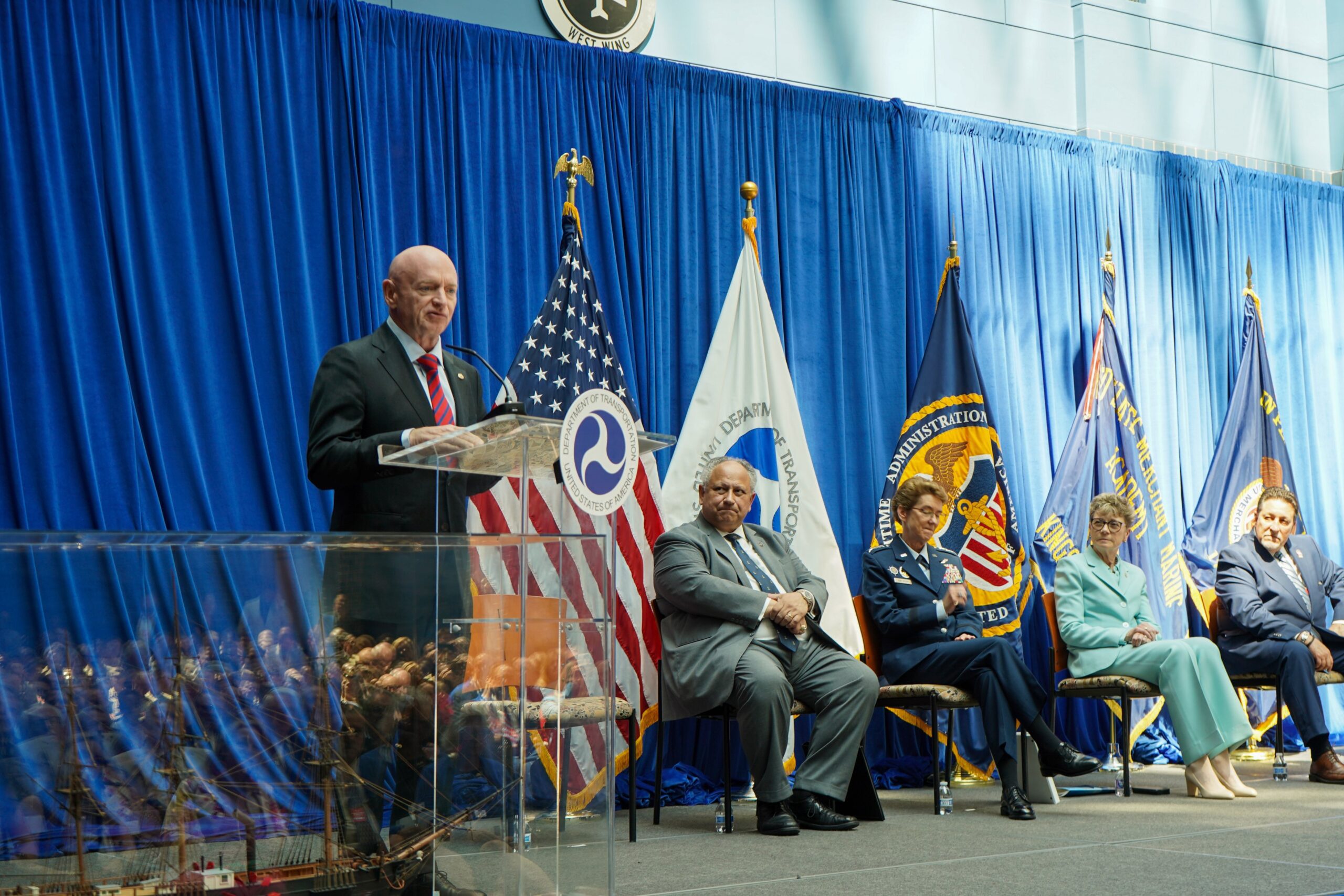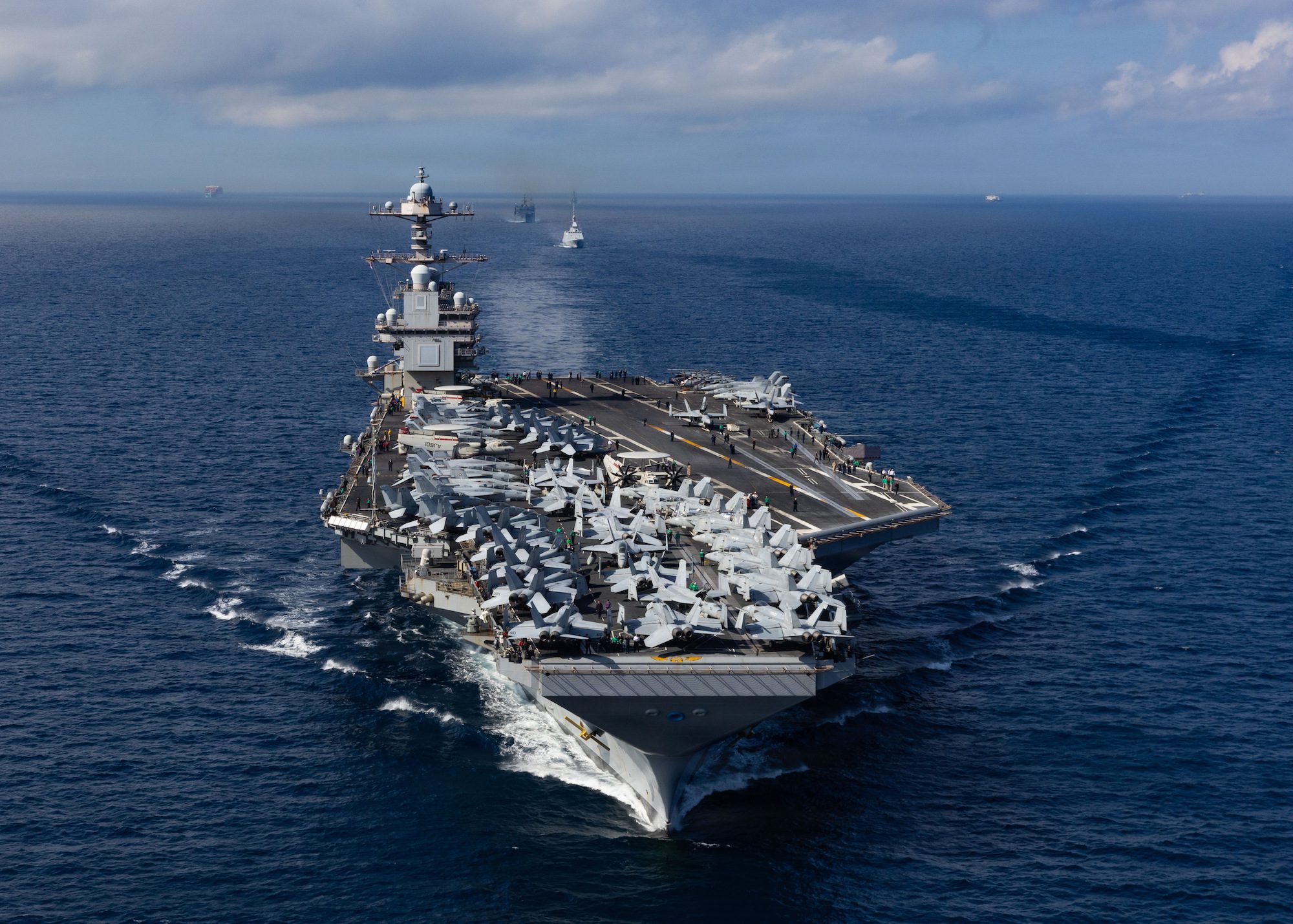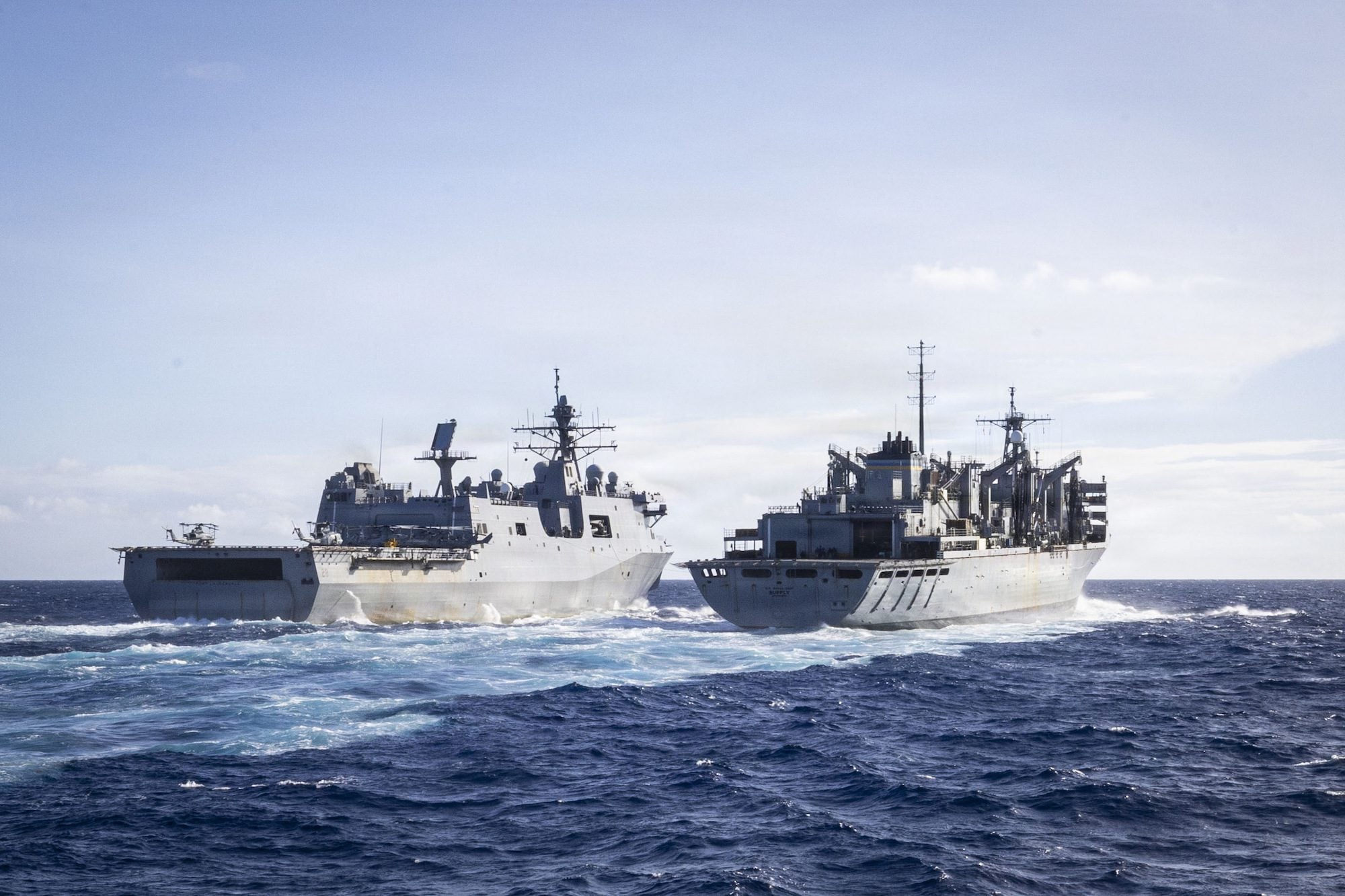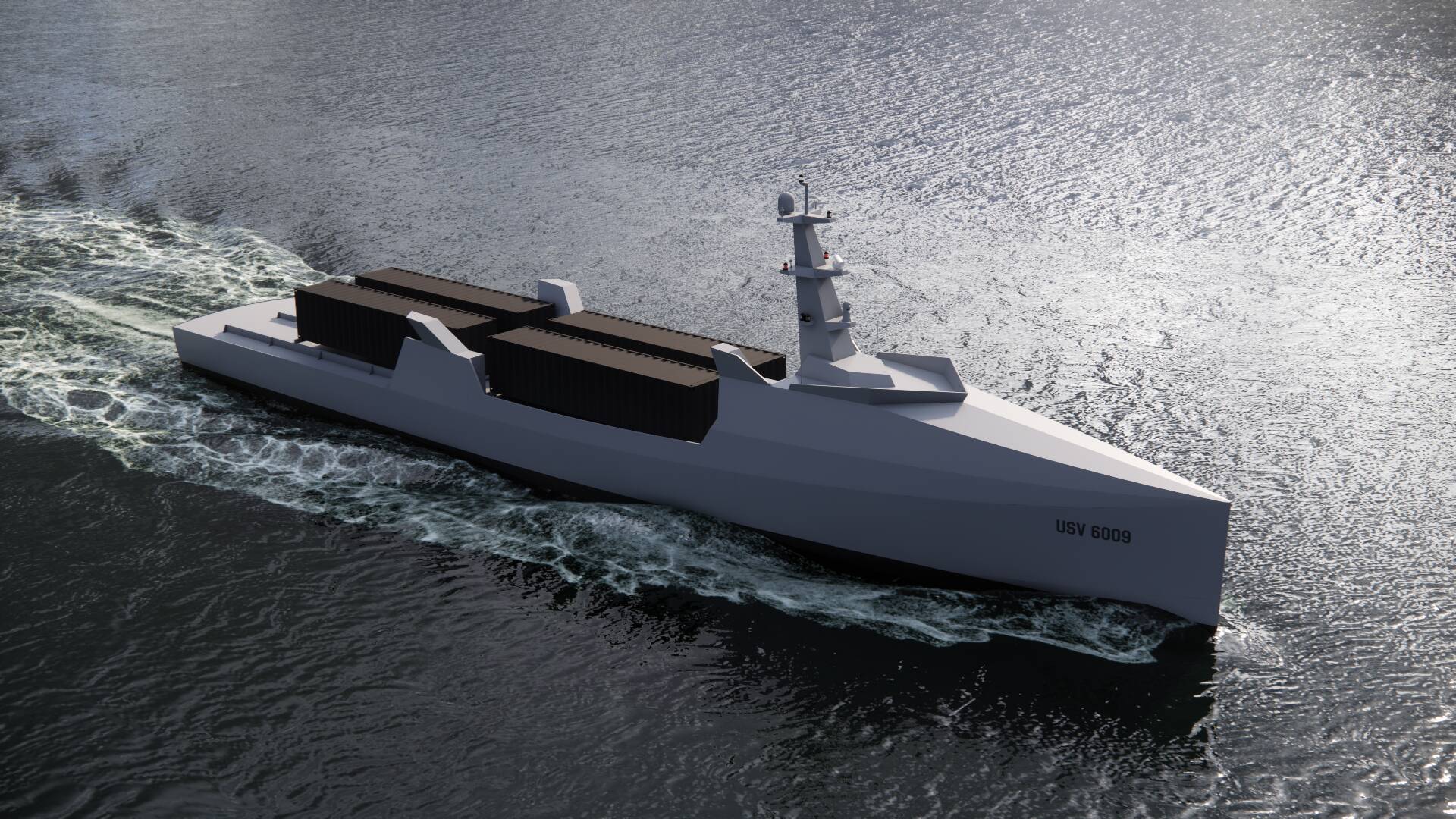By Captain John Konrad (gCaptain Op-Ed) Yesterday, following encouraging remarks from the Secretaries of Transportation and the Navy, Senator Mark Kelly delivered a compelling speech at the National Maritime Day ceremony. He emphasized the necessity to revitalize both the United States Merchant Marine, shipbuilding and the broader US maritime industry. As a former US Navy officer and licensed Merchant Mariner himself, Kelly’s words resonated not only with the maritime professionals present, but also with anyone who appreciates America’s seafaring heritage and the security of global trade during these uncertain times.
Senator Kelly’s passion for the maritime sector is deeply personal, stemming from his grandfather’s service on a Liberty Ship during World War II and his own education at the United States Merchant Marine Academy. His experiences from serving on Merchant Ships during the Cold War to participating in launches off aircraft carriers and into space give him a unique perspective. This viewpoint backstops the need to prioritize maritime concerns in our strategic competition with China.
Kelly is firmly convinced that our maritime industry needs to experience a renaissance.
The senator emphasized a stark reality: the steep decline of our U.S.-flagged international fleet. It has dropped from nearly 400 oceangoing vessels in 1986 to just 80 in international service today, while China possesses nearly 5,500. This significant disparity is not just a statistic; it’s a call to action. In his speech, Kelly discussed his bipartisan (coauthored with Marco Rubio), bicameral (coauthored with Congressmen Waltz and Garamendi) Congressional guidance for a national maritime strategy. This strategy, recently endorsed by the Secretary of the Navy, represents the initial step in upcoming legislation to address this imbalance. The senator advocated for financial incentives, regulatory reforms, and robust maritime security programs.
Kelly’s proposals are pragmatic and comprehensive. He advocates for tax credits and financial tools to incentivize the use of U.S.-flagged vessels, stringent enforcement of Cargo Preference requirements, and reforms to our Maritime Security programs. These measures are designed to make American-flagged, American-crewed vessels competitive again on the global stage.
“I believe all these reforms are not just necessary for the maritime industry,” said Kelly. “I believe they can earn the backing of Republicans and Democrats in both the Senate and the House of Representatives.”
However, Kelly’s vision extends beyond our merchant fleet. He rightly emphasizes the need to revitalize our shipbuilding sector. With only 20 large shipbuilders remaining from a high of over 80 post-WWII, the industry is a shadow of its former self. Drawing parallels to the successful CHIPS Act, Kelly proposes new investment tax credits and incentives to rejuvenate shipbuilding and its supply chain, thereby ensuring that we can build and repair oceangoing vessels right here in the United States.
Revitalizing our maritime workforce is central to Kelly’s vision. He advocates for substantial investments in the U.S. Merchant Marine Academy and State Maritime Academies, alongside support for union schools and MARAD Centers of Excellence. These institutions play a crucial role in training skilled mariners and shipbuilders, who are essential for maintaining our maritime industry.
Moreover, Kelly proposes raising awareness of maritime careers and offering incentives such as public service loan forgiveness and tax breaks for US Merchant Mariners.
Kelly’s speech served as both a call to action and a roadmap for bipartisan cooperation. His strategy document, penned alongside Marco Rubio, Mike Waltz, and John Garamendi, sets the foundation for transformative reforms. This joint effort emphasizes that revitalizing our maritime industry is not merely a partisan goal, but a national necessity.
Reinvigorating our domestic maritime sector will do more than bolster our national security; it will supercharge our economy and create high-paying jobs. It is a strategic move that will enable us to compete more effectively with China and other global powers.
The speech wasn’t entirely optimistic for the US maritime industry. Throughout our history – especially in the last few decades – industry segments have often clashed and Merchant Mariners themselves have frequently criticized each other and politicians who wish to help. Evidence of this can be found in numerous threads on gCaptain’s own forum, suggesting that we are often our own worst enemy. However, as Kelly wisely points out in this speech, achieving this ambitious agenda will require compromise, cooperation, and a collective resolve to overcome challenges.
Can the industry and the U.S. Merchant Marine unite in support of this cause? Is there room for compromise with lawmakers? How many people in our industry will share this speech with their company executives and union representatives? Who will take immediate action and contact their congressional representatives, urging them to read and endorse Kelly’s guidance?
As Kelly pointedly reminded us, the stakes are too high for failure. America, a nation bordered by oceans, has consistently been, and must continue to be, a maritime power. The call to action is unambiguous: we must collectively rise to the challenge, convert these audacious concepts into tangible legislation, and safeguard our maritime future.
“We can not let the perfect become the enemy of the good,” said Kelly. “I am an optimist. We can get this done.”
Let’s respond to Senator Kelly’s call and rebuild our maritime might for our economy, our security, and future generations of mariners. The time to act is now. However, action requires education. Therefore, watch Kelly’s speech and read his guidance. Contact your representatives; if they are Republicans, ask them to reach out to the staff of Rubio or Waltz for a briefing on the guidance. If they are Democrats, ask them to get in touch with Kelly or Garamendi. Encourage any journalists you know to reach out to them or the Secretary of the Navy for an interview. If you are a seafarer or overseas maritime executive concerned about Russia, China, or the Houthis, ask your Navy to visit DC for a briefing on the US Navy’s Maritime Statecraft initiative.
The US Merchant Marine has suffered from neglect, insufficient funding, and lack of appreciation for decades. There is much to be cynical about, however, it’s our responsibility to put aside our skepticism and support those offering robust legislative aid.
Editorial Standards · Corrections · About gCaptain

 Join The Club
Join The Club











